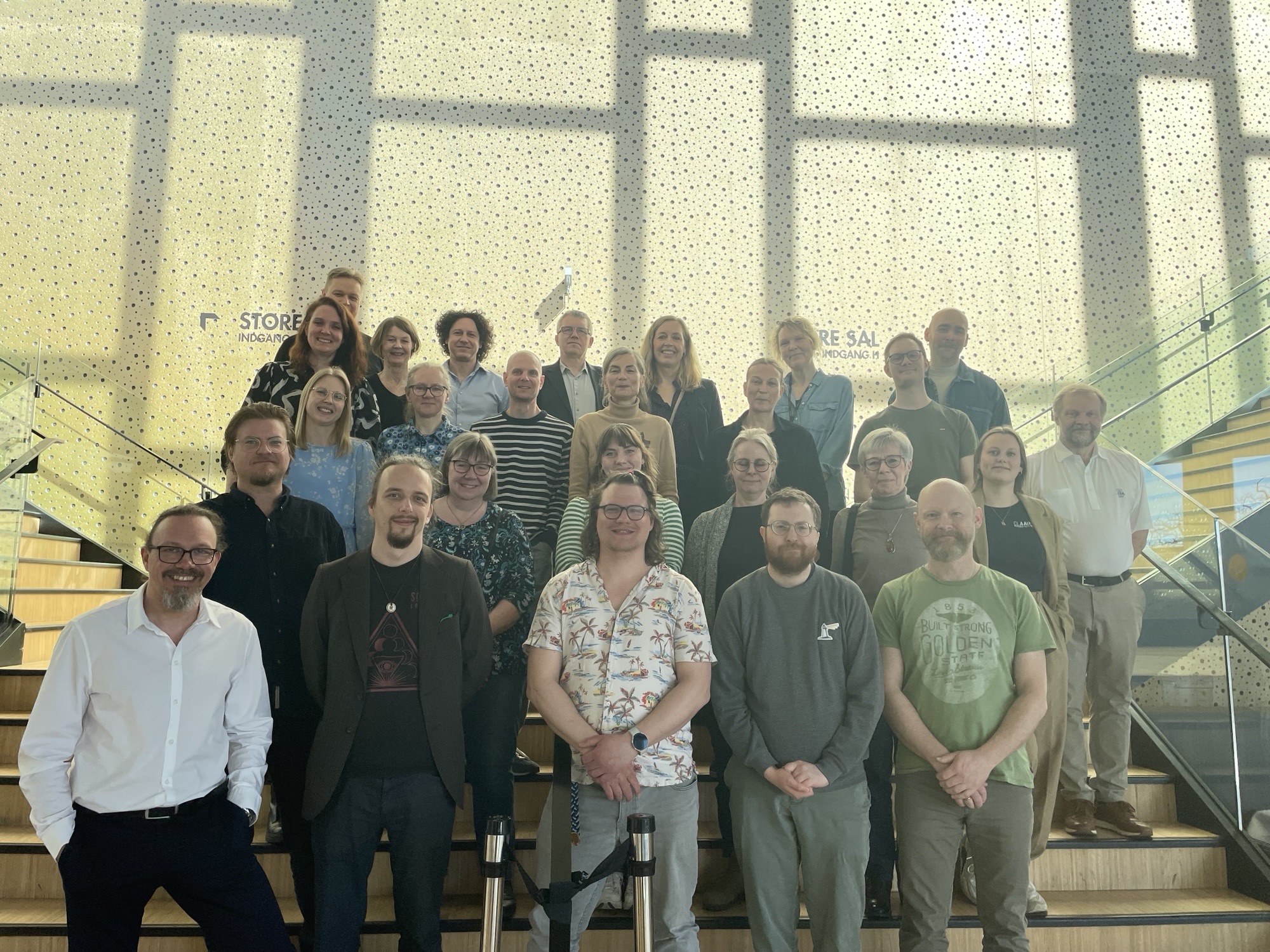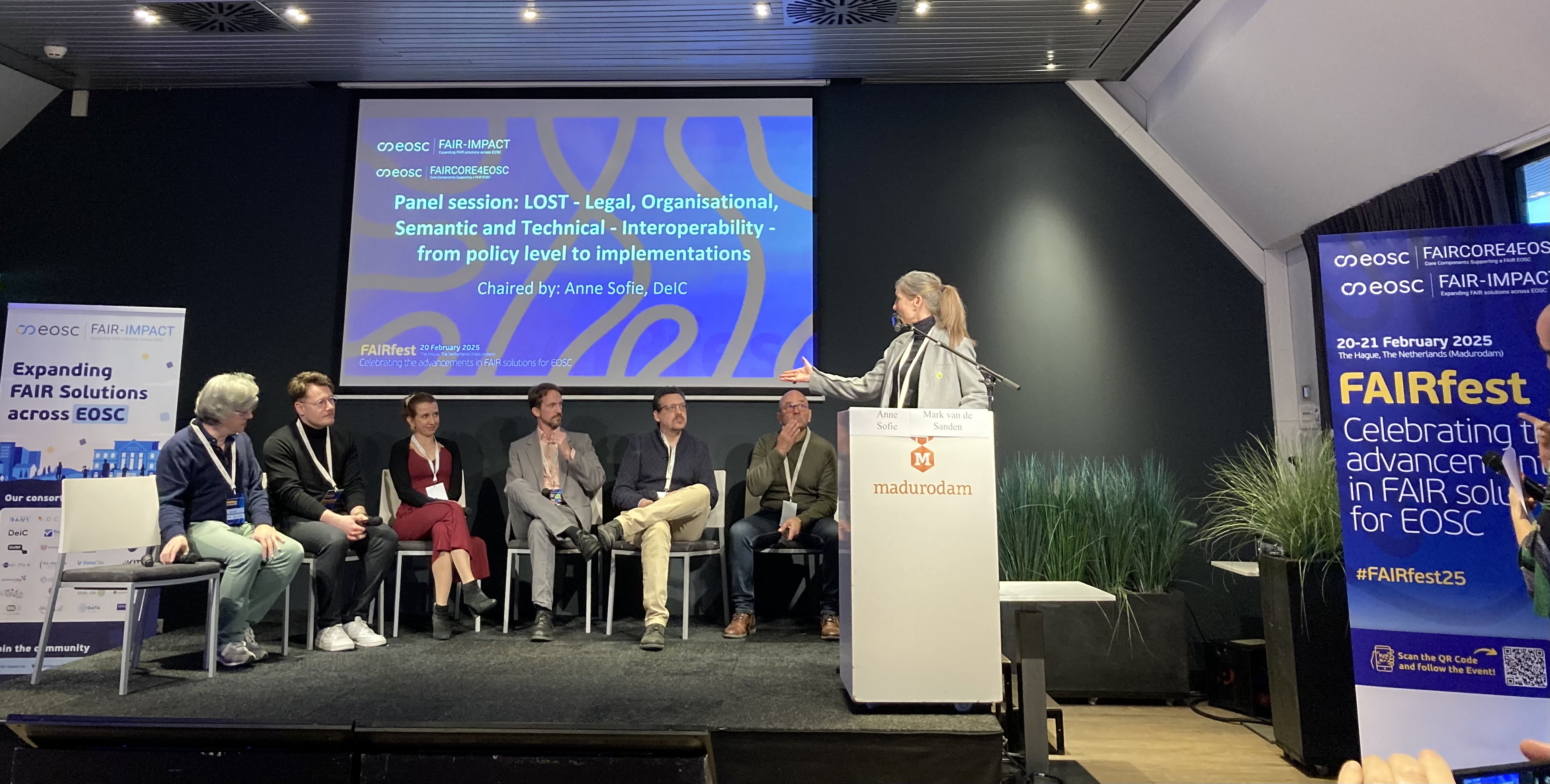Indhold på siden
- Introduktion til FAIR principperne
- Hvorfor FAIR - og hvordan?
- Myter om FAIR
- Oversigt over FAIR værktøjer
- Oversigt over services til datadeling
- Oversigt over informationsressourcer/guides om FAIR
- Samlet oversigt til download
- Eksempler på mere eller mindre FAIR data praksis i konkrete forskningsprojekter
Introduktion til FAIR principperne
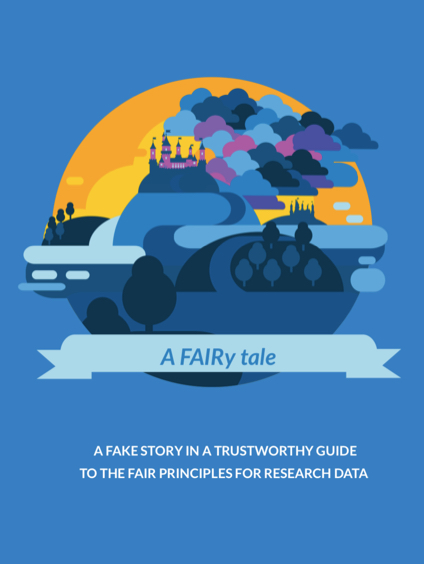
Findable, Accessible, Interoperable og Reusable er hovedprincipperne i FAIR. Der er lidt mere til historien - i alt er der 15 principper der definerer egenskaber som data/metadata/infrastruktur skal have for at kunne findes og genbruges.
Eventyret "A FAIRy tale - A fake story in a trustworthy guide to the FAIR principles for research data" forklarer principperne ét for ét - på en både underholdende, faktuel og ikke mindst pædagogisk måde.
Licens - CC-BY-SA 4.0 Attribute: ‘DK Fair på tværs’
En oversigt over principperne oplistet med tilhørende kort forklaring kan du også finde på go-fair.org/fair-principles/ der er den autoritative kilde.
Hvorfor FAIR - og hvordan?
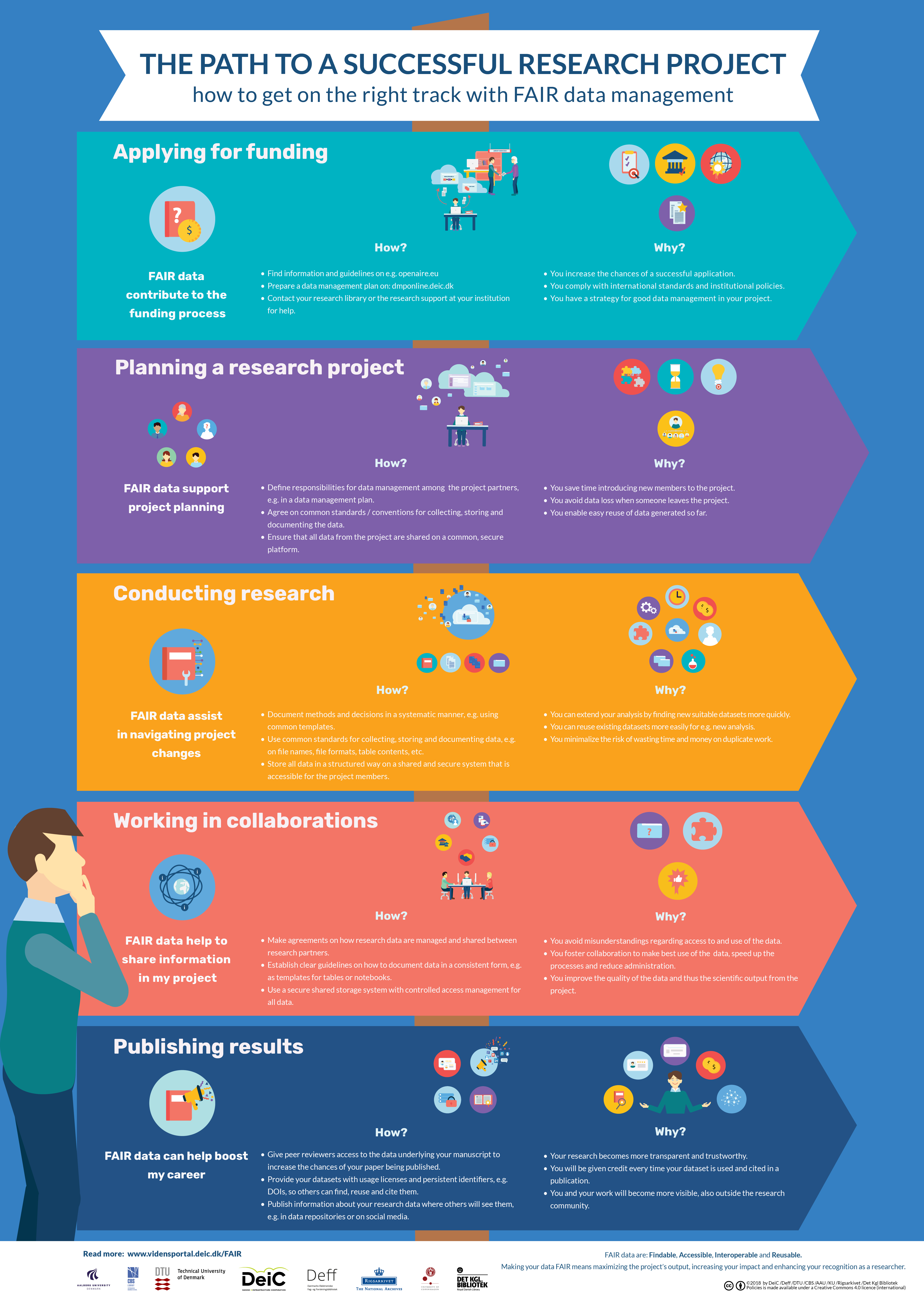
Posteren "The path to a successful research project - How to get on the right track with FAIR data management" fortæller på en enkel måde og for de overordnede faser i dit forskningsprojekt, hvordan du opnår en FAIR data management praksis og hvordan det bidrager til din og projektets succes.
Præsentation med samme budskaber som posteren:
Postkort med samme budskaber som posteren:
- Ansøgning: Forside | Bagside | Print version
- Planlægning: Forside | Bagside | Print version
- Forskning: Forside | Bagside | Print version
- Samarbejde: Forside | Bagside | Print version
- Publisering: Forside | Bagside | Print version
Poster, præsentation og postkort har alle samme licens - CC-BY-SA 4.0 Attribute: ‘DK Fair på tværs’
Myter om FAIR
Der er mange myter om FAIR data. Her får du aflivet nogle af de mest almindelige. Hver myte er lavet som et postkort hvor bagsiden fortæller hvordan virkeligheden er.
|
Billede
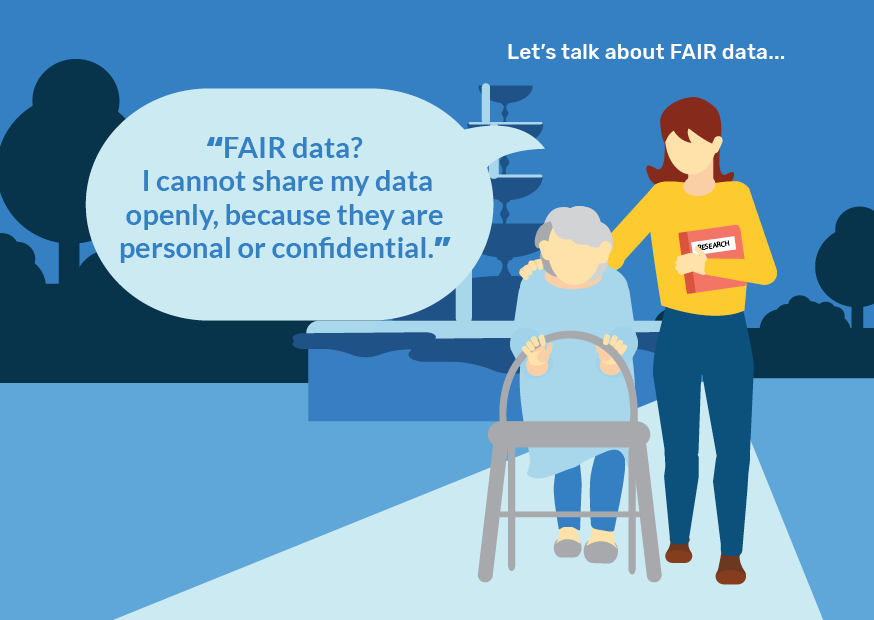
Foto: How To FAIR
|
Billede
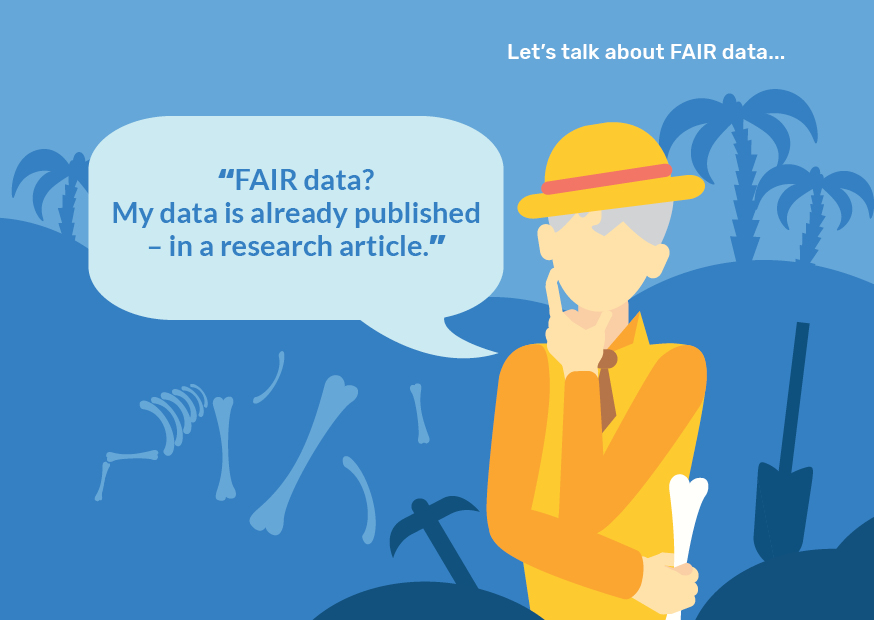
Foto: How To FAIR
|
Billede
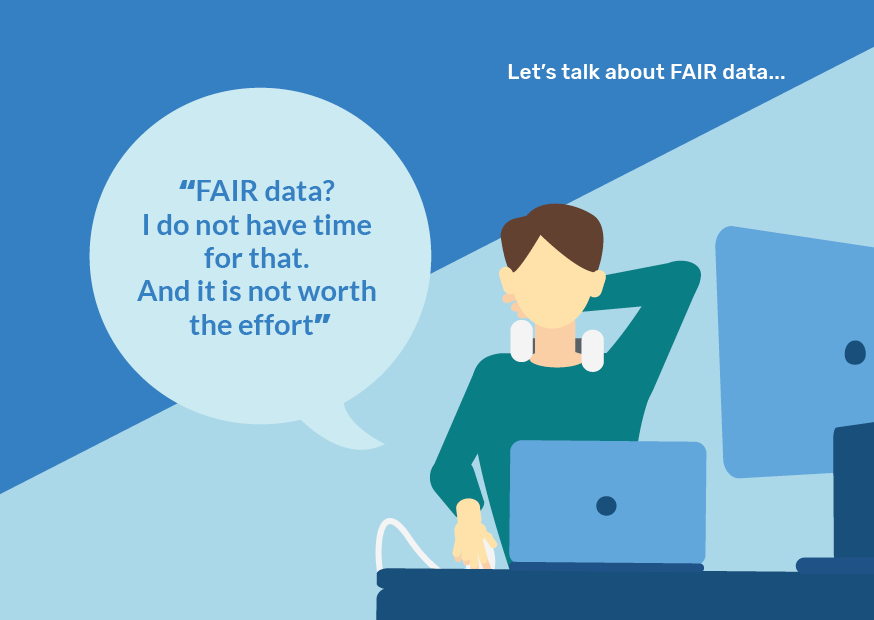
Foto: How To FAIR
|
|
Billede
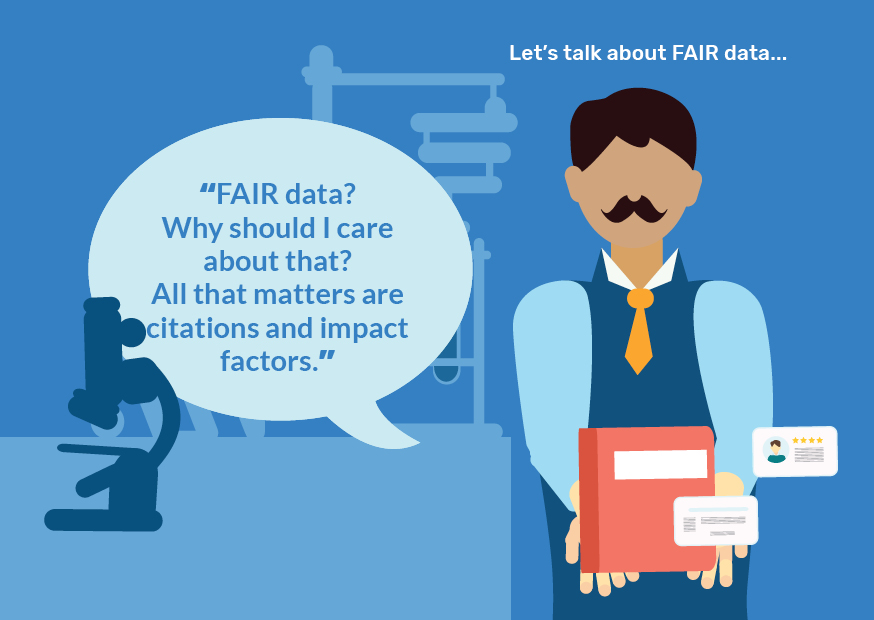
Foto: How To FAIR
|
Billede
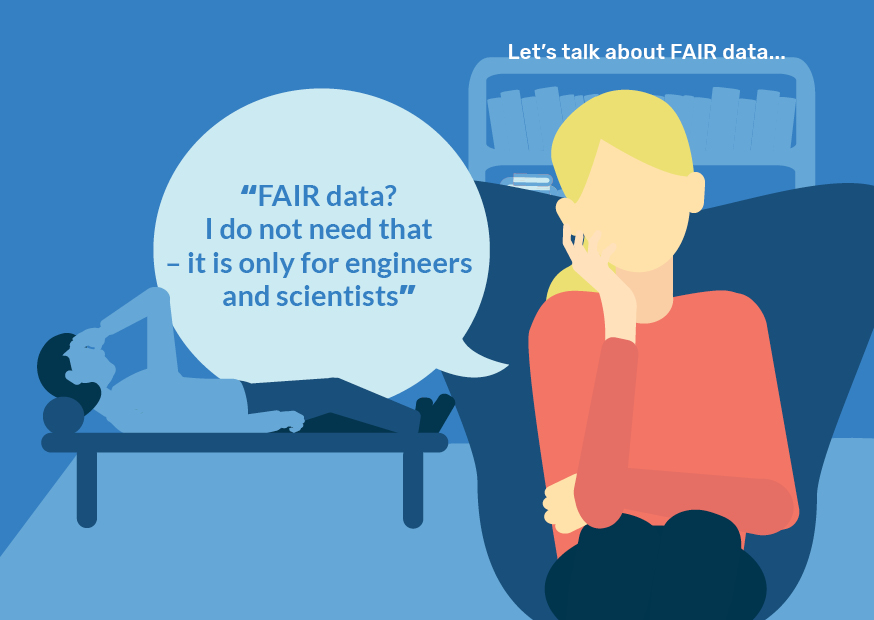
Foto: How To FAIR
|
Billede
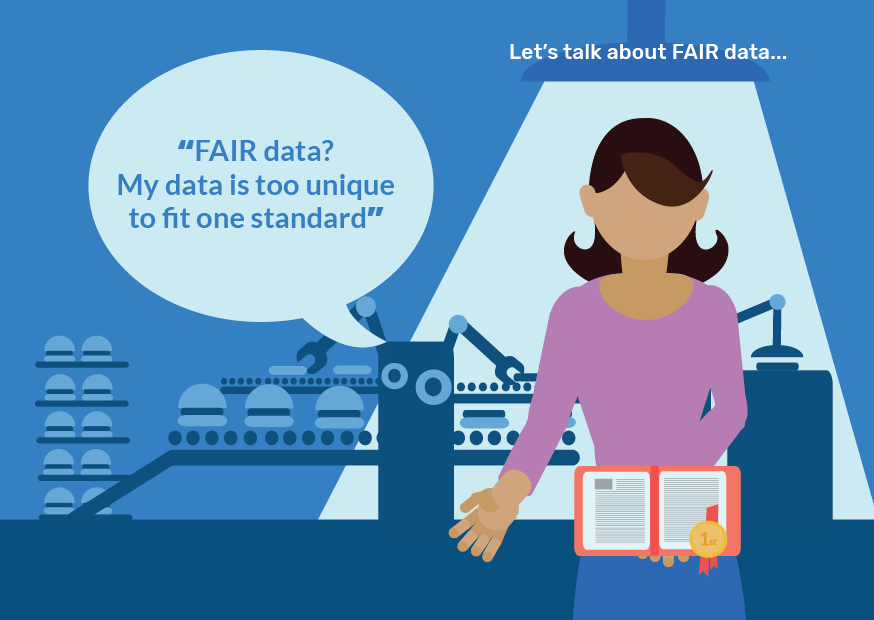
Foto: How To FAIR
|
|
Billede
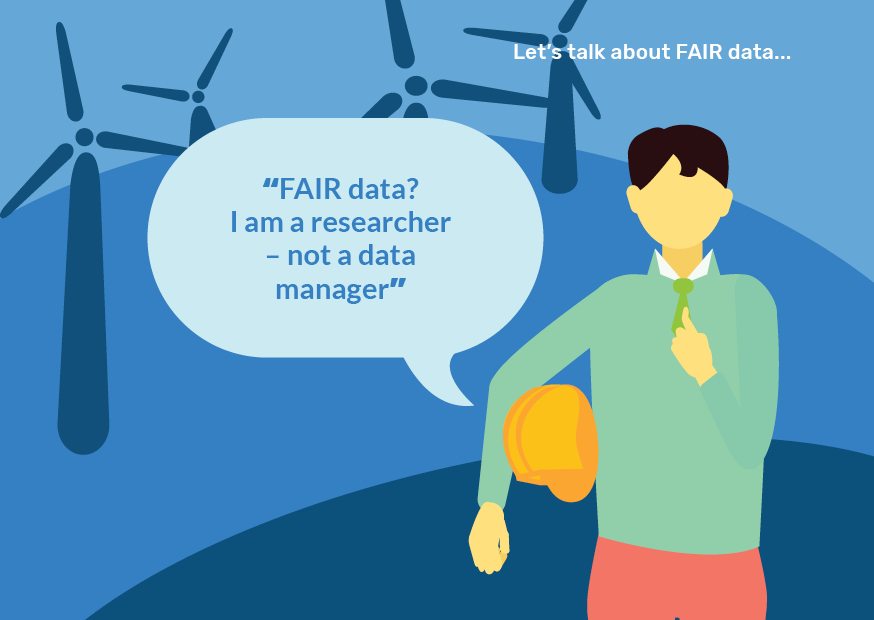
Foto: How To FAIR
|
Billede
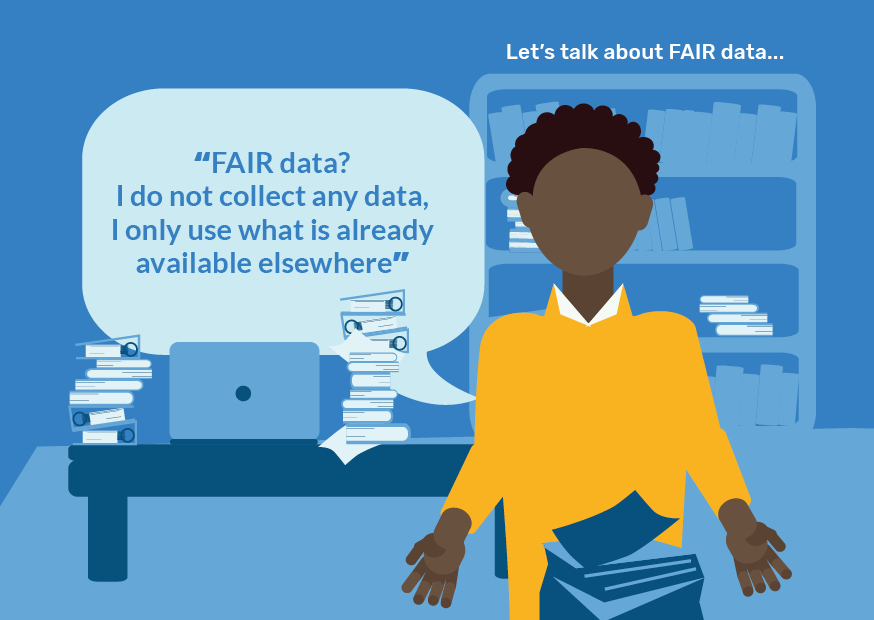
Foto: How To FAIR
|
Billede
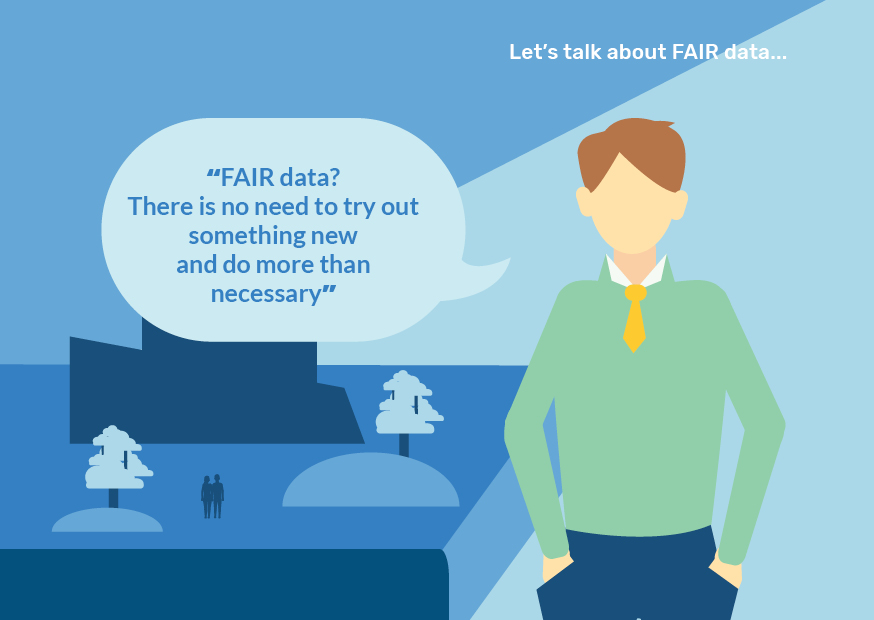
Foto: How To FAIR
|
Alle postkort har samme licens - CC-BY-SA 4.0 Attribute: ‘DK Fair på tværs’
Oversigt over FAIR værktøjer
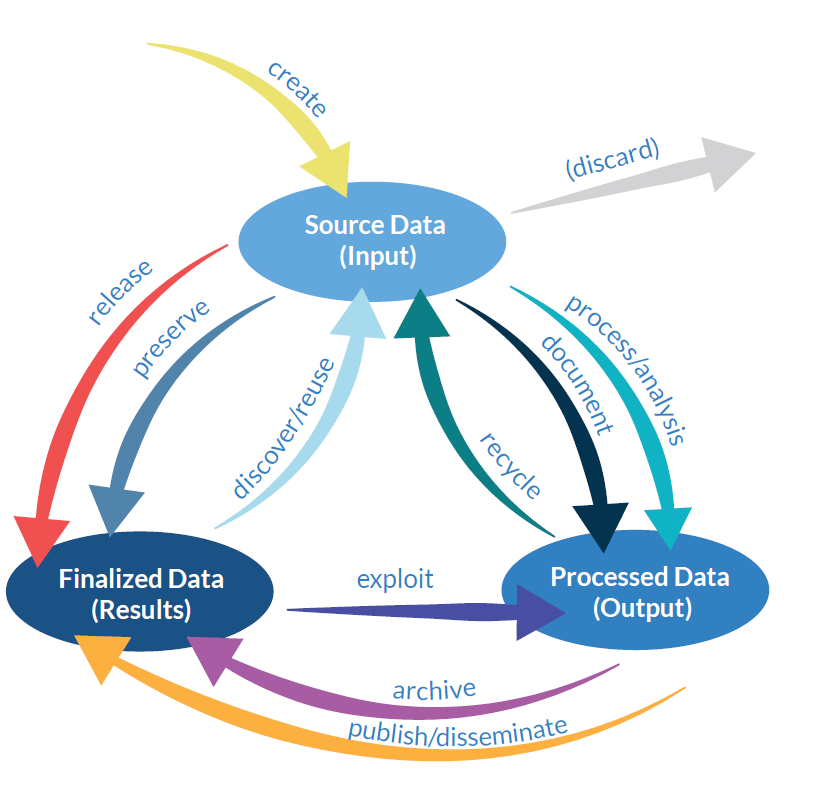
Download en illustration af forskningslivscyklussen her.
Oversigten nedenfor angiver hvilke faser i forskningslivscyklussen værktøjerne er beregnet på at blive brugt i:
- Create: Indsaml eller generer nye data, fx via målinger eller undersøgelser.
- Process/Analyze: Anvendelse af data til alle slags forskningsaktiviteter, inkl. digitalisering, konvertering og fortolkning.
- Document: Tilføj kontekst til dataene, inkl. oprindelse og metadata.
- Recycle: Genbrug tidligere output som input til ny analyse eller fortolkning, også i samarbejder.
- Publish/Disseminate: Tilgængeliggør udvalgte datasæt mv. for andre forskere eller offentligheden.
- Archive: Indlever udvalgte datasæt i systemer beregnet til langtidsbevaring.
- Exploit: Lav forskning direkte på tidligere publicerede data.
- Discover & Re-use: Brug tidligere publicerede data til ny forskning, fx fra offentlige databaser og repositorier.
- Release: Giv adgang til rådata for at andre kan bruge dem.
- Preserve: Bevar rådata i langtidslager.
- Discard: Tilintetgør eller slet data, fx pga. juridiske eller kontraktuelle forhold. Dette forstås ikke som en FAIR proces og tages derfor ikke yderligere i betragtning.
Af tabellen fremgår også hvordan det enkelte værktøj indplacerer sig ift. FAIR dimensionerne. På den måde kan du bruge oversigten til at finde de rigtige værktøjer til at lave dine forskningsdata (mere) FAIR - afhængigt af de data du har, og hvad du vil gøre med dem.
| Availability | Discipline | FAIR dimension | Phases in research life cycle | Service Name | Description |
|---|---|---|---|---|---|
| International | Generic (Tabular data) | __I_ |
Process/Analyze |
OpenRefine | OpenRefine is a standalone open source desktop application for data cleanup and transformation to other formats (i.e. data wrangling) |
| International | Generic | FA(I)(R) | Publish/Disseminate, Archive, Discover & Re-use, Release, Preserve | Zenodo |
Zenodo is a general-purpose open access research data repository, hosted by CERN (Switzerland) that provides a place for researchers to deposit datasets. Researchers in any subject area to are able to upload files up to 50 GB. It has an integration with GitHub to make code hosted in GitHub citable. Support: zenodo.org/support |
| International | Generic - Highly recognized in Social Sciences | FA(I)(R) | Publish/Disseminate, Archive, Discover & Re-use, Release, Preserve | Harvard Dataverse | Dataverse is a data repository that is widely used within the Social Sciences. Researchers can login with their institutional credentials via WAYF. Data can be made findable by applying discipline-specific metadata schemes and digital object identifiers (DOIs). Data is made reusable by specifying relevant re-use licenses. |
| International | Generic (Software) | _A(I)(R) | Create, Process/Analyze, Document, Recycle, Publish/Disseminate | Jupyter Notebooks | The Jupyter Notebook is an open-source web application that allows you to create and share documents that contain live code, equations, visualizations and narrative text. Uses include: data cleaning and transformation, numerical simulation, statistical modeling, data visualization, machine learning, and much more. |
| International | Generic | _A(I)(R) | Publish/Disseminate, Archive | B2SHARE | B2SHARE is a user-friendly, reliable and trustworthy way for researchers, scientific communities and citizen scientists to store and share small-scale research data from diverse contexts |
| International | Generic | F___ | Discover & Re-use | B2FIND | B2FIND is a discovery service based on metadata steadily harvested from research data collections from EUDAT data centres and other repositories. |
| International | Generic (Tabular data) | __IR | Document | Data Package Creator | Data Package is a simple container format used to describe and package a collection of data. It can be used to package any kind of data. At the same time, for specific common data types such as tabular data it has support for providing important additional descriptive metadata -- for example, describing the columns and data types in a CSV. The Data Package format provides a simple way to improve data interoperability that supports frictionless delivery, installation and management of data. |
| International | Generic (Tabular data) | ___R | Process/Analyze | Good Tables | Good Tables is a web service where data can be provided in CSV or Excel format, and the file will be validated for well-formedness (for example, no empty rows or columns, no duplicate rows, all rows have valid dimensions, and so on), and conformance to a schema (if a JSON Table Schema is supplied). |
| National | Generic | F___ | Publish/Disseminate, Discover & Re-use, Release | DataCite |
DataCite is a global non-profit organisation that provides persistent identifiers (DOIs) for research data. It is possible to assign DOIs to datasets and other research objects. This way DataCite supports researchers in their efforts to find, identify, and cite research data and other research objects. Support: datacite@deic.dk |
| National | Humanities | FA(I)(R) | Publish/Disseminate, Archive, Discover & Re-use, Release, Preserve | CLARIN.dk Repository |
Data repository for making language data shareable. Each data set gets a PID, and the metadata are searchable. CLARIN.dk is part of the European CLARIN ERIC community (see clarin.eu), which offers a number of services. Metadata information from the data sets will be harvested by the European service Virtual Language Observatory vlo.clarin.eu, and will be made availabe for researchers outside Denmark. Support: info@clarin.dk |
| National | Social Sciences | FA(I)(R) | Exploit, Discover & Re-use | Danmarks Statistik Forskerservice |
Statistics Denmark's open data are official statistics data, which are electronically available in a way that users can apply them directly in various applications. They can be accessed either via a user interface or via an API against the StatBank. Data can be freely used in the development of various services, including development of apps for smartphones. All statistics on Statistikbanken.dk and the website dst.dk can be used free of charge. Data are licensed under Creative Commons, CC-BY 4.0. Support: dst@dst.dk |
| National | Social Sciences and Health Sciences | FA__ | Publish/Disseminate, Preserve, Archive | Rigsarkivet |
Rigsarkivet/The National Archives offer archival services for research data. Data will be preserved according to appraisal standards. All research data disseminated by Rigsarkivet will have a persistent identifyer - DOI. Support: mailbox@sa.dk |
| National | Social Sciences and Health Sciences | FAIR | Exploit, Discover & Re-use | Rigsarkivets research support and survey data collections |
Search engine containing all research data handed in to Danish Data Archive and Rigsarkivet since 1973. Covers both surveydata, cohortes, registries etc. All data and metadata are processed and enriched with metadata according to domain-specific and international standards and contain controlled vocabularies, classifications and keywords. Data are available in several formats. Codebook information is open and available online. Support: mailbox@sa.dk |
| National | Social Sciences and Health Sciences | _(A)IR | Exploit, Discover & Re-use | DDD Online |
Online tool with surveydata from Rigsarkivet, where it's possible to make online statistical analysis and download results. Support: mailbox@sa.dk |
| National | Generic | _A(I)(R) | Publish/Disseminate, Archive, Discover & Re-use | LOAR |
LOAR is a general-purpose open access research data repository for Danish researchers. The service creates a DataCite DOI for each dataset and stores it for at least five years. All data in LOAR is considered Open Access and will either be placed under a basic distribution license or under a Creative Commons licence. LOAR also hosts open access data from the Danish Royal Library collections. Support: datarepo@kb.dk |
| Institutional AAU | Generic | FA(I)(R) | Publish/Disseminate, Discover & Re-use, Release, Preserve, Archive | VBN |
"VBN allow for registration (and possible upload) of datasets, including harvesting to the national and international portals, like forskningsdatabasen.dk and openaire.eu A dataset can utilize the binding features of VBN, to make a connection between a dataset and a publication, a project or the like. This is not mandatory, and a dataset can exist in VBN on its own." Support: vbn@aub.aau.dk |
| Institutional AAU | Generic (Software) | _AI(R) | Process/Analyze, Document, Recycle | Subversion | Subversion is version control system that keeps track of changes made to files and folders (directories), facilitating data recovery and providing a history of the changes that have been made over time. |
| Institutional DTU | Generic | FA(I)(R) | Publish/Disseminate, Archive, Discover & Re-use, Release, Preserve | DTU Data |
DTU Data is the instituional data repository of DTU hosted by Figshare. DTU Data allows DTU’s researchers to publish datasets, with almost no restrictions on formats and file sizes. All published datasets are provided with metadata, a DOI and a usage licenses. Data/metadata published in DTU Data will by default be openly accessible. However, creators can restrict the access to their data, e.g. for peer-reviewers or collaborators. It has an integration with GitHub to make code hosted in GitHub citable. Support: datamanagement@dtu.dk |
| Institutional DTU | Generic (Software) | _AI(R) | Process/Analyze, Document,Recycle, Publish/Disseminate, Discover & re-use, Release | GitLab |
GitLab is a tool for versioning, documenting and publishing code. It is available as a Hub for all students and researchers at DTU. It does not provide DOIs automatically. DTU deparments can deploy GitLab on their own servers contacting DTU's Research-IT (ait-fit-server-net-support@dtu.dk). Support: gbar.dtu.dk/faq/94-gitlab |
| Institutional KU | Generic | (F)A(I)(R) | Publish/Disseminate, Archive, Release, Preserve | Data DOI (ERDA) |
Data DOI is a service using KU's internally developed storage system (ERDA) and web-interface with metadata form. The service creates a DataCite DOI for the dataset and enables medium long term archiving of research data for reserachers at KU. The service is only accessible and described via KU's internal network. It is not suitable for Personal Data. Support: support@erda.dk |
Oversigt over services til datadeling
| Availability | Service Name | Description |
|---|---|---|
| International | B2DROP | B2DROP is a secure and trusted data exchange service for researchers and scientists to keep their research data synchronized and up-to-date and to exchange with other researchers. |
| National DTU/i2 |
ScienceData | "ScienceData is a sharing & collaboration tool provided by DTU/i2. It can be accessed via ORCID or institutional credentials. It has integrated features to: - publish your data to Zenodo - add standard metadata schemas – or supply your own metadata to your datasets - organize data using colored tags - sync individual folders (selected by the user) - connect to compute nodes (ABACUS2.0) or virtual machines - make your own apps for processing (open API) - add back up sites at other geographical locations" |
| Institutional AAU | HCP Anywhere | Institutional provided sync’n’share tool for collaboration on files. |
| Institutional AAU | OneDrive | Sync’n’share tool for collaboration on files. Provided by Microsoft Corp. |
| Institutional DTU | Files DTU | File DTU is the ”Dropbox-like” service (sync’n’share) tool that supplement the existing network drives that meets DTU requirements for IT-Security / IT-Control. |
Oversigt over informationsressourcer/guides om FAIR
| Availability | Discipline | FAIR dimension | Service Name | Description |
|---|---|---|---|---|
| International | Social Science | FAIR | CESSDA Expert Tour Guide on Data Management | This tour guide aims to help social scientists to make their research data findable, understandable, sustainably accessible and reusable. |
| International | Generic | __IR | UK Data Service | The UK Data Service (National archive) website contain guidance in data use, best practices for data preservation and sharing standards. In this link, researchers can find guidance on file formats recommended and accepted by the UK Data Service for data sharing, reuse and preservation, which are applicable to use for any other data repository or archive. |
| International | Generic | __IR | Registry of Research Data Repositories | re3data.org is a global registry of research data repositories that covers research data repositories from different academic disciplines. |
| International | Generic | __IR | FAIRsharing | Researchers can find a catalogue of metadata standards, databases and policies. This information is particularly useful during the planning phase of a research project. |
| National | Generic | FAIR | Rigsarkivet Datamanagement | Researchers can find more information about the RDM policy of the Danish National Archives and also find links to several usefull tools. |
| Institutional AAU | Generic | FAIR | CLAAUDIA | CLAAUDIA is a strategic initiative that joins forces between IT Services and the University Library. We provide a technical and a human infrastructure providing compute and storage solutions as well as training, support and advisory. We are staffed with research IT professionals, data managers and data scientists to support the research data handling from application to archive. |
| Institutional CBS | Generic | FAIR | CBS - Research Data Management | On this website you can find information about CBS' RDM policy, CBS RDM Support and best practices within data management. |
| Institutional DTU | Generic | FAIR | DTU Inside - Research Data | On DTU Inside researchers find a guide which covers the background and aspects of data management. The guide is going through the steps of the data life cycle and how to use to the DMPonline tool. It also includes toolboxes for managing research data and data collection, and a section describing the support the data management group offers. |
| Institutional KU-HUM | Humanities | FAIR | KU-HUM's Datamanagement info site | Information to researchers about research data management and where to look for more detailed information, including links to webpages on GDPR. |
| Institutional KU | Generic | FAIR | KU's Datamanagement info site | Information about research data management and GDPR (only accessible for KU-employees). |
| Institutional SDU | Generic | FAIR | Research Data Management support | Researchers can find information about what kind of services SDU provide regarding research data management, a link to the SDU Open Science Policy, links to recommended resources (e.g. DMPonline, an internal webpage on GDPR and links to the participating units). An overview of the group of people providing RDM Support is also available together with a link to the DM Forum website, which governs the RDM Support unit. |
Samlet oversigt til download
Eksempler på mere eller mindre FAIR data praksis i konkrete forskningsprojekter
FAIR principperne er ikke nødvendigvis nemme at efterleve. I det følgende er en række aktive forskningsprojekters udfordringer ift. FAIR beskrevet - inkl. forslag til hvordan det enkelte projekt kan arbejde i retning af mere FAIR data.

